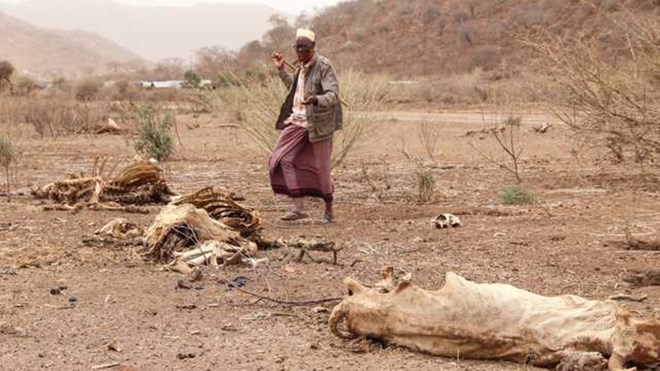
By AMINA WAKO
Sunday September 25, 2022

Kenya, Somalia and Ethiopia may be in for a longer spell of food shortages following a fifth straight year of drought in their driest regions.
A situational report by the UN Office for Co-ordination of Humanitarian Affairs (Ocha) says that at least 36 million people in the Horn of Africa will be affected by drought by this October, and the number could rise to 80 million by end of the year if the rains do not improve.
While drought may not bring famine — the widespread scarcity of food may cause starvation —Ocha says two districts in southern Somalia’s Bay region are approaching this level.
Ocha is reporting that the rains for the comings months will be just as poor as in earlier seasons.
The UN agency says currently, Ethiopia is the heaviest hit, with 24.1 million people in need of food aid, as drought is exacerbated by the conflict in Tigray.
Another 7.8 million in Somalia and 4.2 million in Kenya need food. Put together, the number is twice year-on-year compared with 2021.On the sidelines of the UN General Assembly this past week, countries pledged to help Somalia, with US Aid for International Development (USAid) pledging $151 million for food and “resilience and economic recovery.”
“Joint international action early in the crisis could have stopped the spread of hunger. We urgently need support to prevent famine,” said Abdirahman Abdishakur, Somalia’s special envoy for drought response.
Ocha, however noted that while drought may have destroyed food sources, global crises are responsible for high food prices.
At least nine million livestock have died in the three countries, cutting off a crucial lifeline for pastoralist communities, according to the latest Food Security and Nutrition Working Group Drought Special Report.
“The severity and duration of this drought present an existential threat to pastoralist communities in the hardest-hit areas. Experience shows that it takes at least five years for a pastoralist family to rebuild their herd after a drought. However, with many families having lost all of their livestock during this drought ... some may be forced to leave pastoralism,” Ocha said on Wednesday in a bulletin.
- Additional Reporting by Abdulkadir Khalif